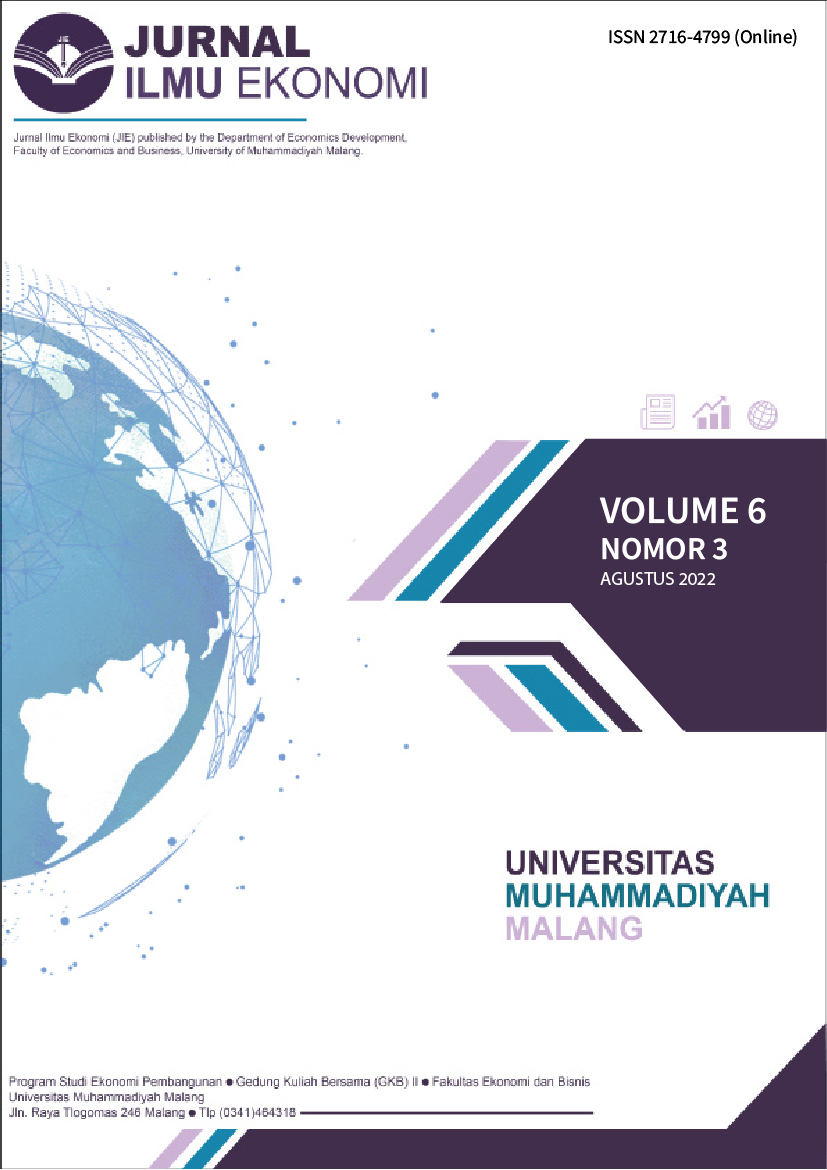Analisis Faktor-Faktor yang Mempengaruhi Tingkat Kemiskinan di Provinsi Gorontalo Tahun 2016-2020
DOI:
https://doi.org/10.22219/jie.v6i3.22249Abstract
The purpose of this study was to analyze the population, education, and economic growth of the poverty level in the district/city of Gorontolo province. This thesis uses quantitative research with panel data types sourced from the Central Statistics Agency of Gorontalo province and the number of samples is 6 districts/cities. The analysis used in this research is panel data regression which is processed through Stata 16 and the selected model is Random Effect. In this study, the results are as follows: 1). The variables of population, education, and economic growth partially have a negative and significant influence on the poverty level in the district/city of Gorontalo province 2). The variables of population, education, and economic growth simultaneously have an influence on the poverty level in the Regency/City of Gorontalo province.
Downloads
References
Arsyad, L. (1999). Pengantar perencanaan dan pembangunan ekonomi daerah, Edisi pertama, penerbit BPFE,Yogyakarta. Yogyakarta BPFE 1999.
Boediono. (2012). Teori Pertumbuhan Ekonomi; Yogyakarta: BPFE, 1988. Yogyakarta: BPFE, 1988.
Dita, N. H. (2021). Analisis jumlah penduduk, IPM dan PDRB ADHB terhadap jumlah penduduk miskin Kota Midan tahun 2010-2019. Jurnal Pembangunan Perkotaan, 9(1).
Kuncoro, M. (2006). Ekonomika Pembangunan: Teori, Masalah dan Kebijakan. Unit Penerbit dan Percetakan STIM YKPN.
Mankiew, G. (2000). Teori Makro Ekonomi. Jakarta: Erlangga.
Nasir, M. M., & Saichudin, M. (2014). Analisis Faktor-Faktor Yang Mempengaruhi Kemiskinan Di Indonesia. 4(2).
Salbiah, R. A., & Wijaya, A. (2016). Faktor-Faktor yang Mempengaruhi Tingkat Kemiskinan. Jurnal Ilmu Ekonomi Mulawarman, 1(1), 1–13.
Septian, D. A. (2021). The effect of education level and economic growth on poverty in East Java. Technium Social Sciences Journal, 16(229–233).
Suripto, & Lalu, S. (2020). Pengaruh Tingkat Pendidkan, Pengangguran, Pertumbuhan Ekonomi Dan Indeks Pembangunan Manusia Terhadap Kemiskinan Di D.I.Yogyakarta Priode 2010-2017. Jurnal Ilmiah Ekonomi Pembangunan, 1(2).
Suryawati, C. (2005). Memahami Kemiskinan Secara Multidimental. Jurnall Manajemen Pelayanan Keshatan, 08(03).
Tambunan, T. (2014). Perekonomian Indonesia: Kajian Teoritis dan Analisis Empiris. Jakarta: Ghalia Indonesia.
Todaro, M. P. (2000). Pembangunan Ekonomi di Dunia Ketiga, Edisi Ketujuh, Terjemahan Haris Munandar,Penerbit Erlangga, Jakarta.
Todaro, M. P. (2011). Pembangunan Ekonomi. Jilid 1. Edisi 11. Alih Bahasa. Penerbit Erlangga. Jakarta.
Todaro, M. P., & Stephen, C. S. (2013). Pertumbuhan Ekonomi di Dunia Ketiga. Edisi Kedelapan. Jakarta: Penerbit Erlangga.
Wibowo, A. D. (2014). Pengaruh Pembiayaan Pendidikan, Tingkat Pendidikan, Pertumbuhan Ekonomi dan Kemiskinan di Jawa Tengah. Jurnal Economia, 10(2).
Downloads
Published
How to Cite
Issue
Section
License
Copyright (c) 2022 Rahman, H., Susilowati, D., & Pramuja, R. A.

This work is licensed under a Creative Commons Attribution-ShareAlike 4.0 International License.
Authors who publish with this journal agree to the following terms:
- For all articles published in the JIE (Jurnal Ilmu Ekonomi), copyright is retained by the authors. Authors give permission to the publisher to announce the work with conditions. When the manuscript is accepted for publication, the authors agree to the automatic transfer of non-exclusive publishing rights to the publisher.
- Authors retain copyright and grant the journal right of first publication with the work simultaneously licensed under a Creative Commons Attribution-NonCommercial-ShareAlike 4.0 International License that allows others to share the work with an acknowledgement of the work's authorship and initial publication in this journal.
- Authors are able to enter into separate, additional contractual arrangements for the non-exclusive distribution of the journal's published version of the work (e.g., post it to an institutional repository or publish it in a book), with an acknowledgement of its initial publication in this journal.
- Authors are permitted and encouraged to post their work online (e.g., in institutional repositories or on their website) prior to and during the submission process, as it can lead to productive exchanges, as well as earlier and greater citation of published work (See The Effect of Open Access).
This is an open access article and licensed under a Creative Commons Attribution-NonCommercial-ShareAlike 4.0 International License








